
Let us form one body, one heart, and defend to the last warrior
Let us form one body, one heart, and defend to the last warrior our country, our homes, our liberty, and the graves of our fathers.






Hearken, O children of future ages, and heed the stirring voice of Tecumseh, the noble chief of the Shawnee, whose heart beat with the fierce rhythm of homeland and heritage. He cried out: “Let us form one body, one heart, and defend to the last warrior our country, our homes, our liberty, and the graves of our fathers.” In these words resounds the eternal call of unity, courage, and devotion, a summons to bind individual strength into a collective force, and to guard with undying resolve that which is sacred: the soil of the homeland, the hearth of the family, the freedom of the soul, and the resting places of ancestors.
Tecumseh spoke in the early 19th century, a time when the lands of his people were threatened by encroaching settlers and the advance of foreign dominion. His vision of unity was profound: he saw that tribes divided were vulnerable, but that tribes united could resist subjugation and preserve the essence of their culture. To him, liberty was not a mere abstract word; it was the air breathed by children, the safety of families, and the continuity of a people whose ancestors had walked these lands long before the footprints of others appeared.
The meaning of his words is both heroic and moral. “One body, one heart” is a call to solidarity, urging each member of a community to see their fate intertwined with the others, to recognize that the strength of the many flows through the courage of each. To defend country, homes, and liberty is to defend not only physical places but the spirit and identity of a people, the memory of the ancestors, and the promise of the future. Tecumseh teaches that valor is inseparable from love and loyalty, that courage must be rooted in the sacred bond of kin and clan.
Consider the Battle of the Thames in 1813, where Tecumseh, allied with British forces, fought valiantly against American expansion into native territories. He rallied warriors from many tribes, forging a united front in defense of their lands and families. Though the battle ended in defeat and Tecumseh himself fell, his words and deeds became immortal. The unity he preached and the courage he displayed inspired generations, showing that honor and devotion endure beyond the physical loss of life.
Yet Tecumseh’s wisdom is not merely a tale of war; it is a teaching of the heart. He emphasizes that defense of one’s homeland is not selfishness but a sacred duty: the preservation of ancestral graves binds the present to the past, ensuring that the memory, lessons, and sacrifices of forebears are never forgotten. Each act of courage, every stance for liberty, is a bridge between generations, a testament to continuity, reverence, and communal strength.
The lesson for those who hear this teaching is profound: unity and loyalty are the pillars upon which freedom and security rest. In times of trial, the strength of one is magnified when fused with the courage of others. To defend what is sacred—whether homes, communities, or principles—is to honor both ancestors and descendants. One must cultivate solidarity, resilience, and moral courage, recognizing that liberty is fragile and must be safeguarded with vigilance and heart.
In practical terms, one may follow Tecumseh’s guidance by fostering community, shared purpose, and defense of what is just and sacred. Engage in acts that strengthen bonds with family, neighbors, and fellow citizens. Protect the heritage and rights that define your society. Stand united against injustice, and let your courage be measured not by fearlessness alone, but by the devotion that flows from love for the land and its people.
Thus, let the descendants of all lands carry this wisdom as both shield and flame. Unite as one body, one heart, and let your actions honor the sacred memory of those who came before. Defend with courage what is precious, safeguard the freedom of the present, and ensure that the future may inherit a world where homes, liberty, and ancestral graves remain revered and secure. In this, the spirit of Tecumseh endures, a beacon of heroism, unity, and eternal vigilance.






AAdministratorAdministrator
Welcome, honored guests. Please leave a comment, we will respond soon